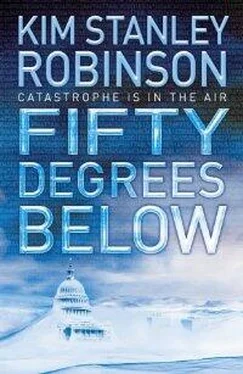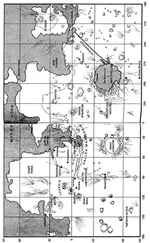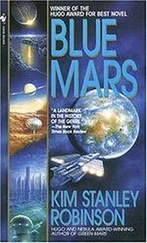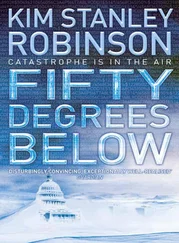He slipped off in a different direction, down through windrows of detritus, then over hardened mud between trees. Branches clicked damply underfoot. It got steeper than he thought it would, and he stepped sideways to keep from slipping.
Then he heard another sound, quieter than the voices. A soft rustle and a creak, then a faint crack from the forest below and ahead. Something moving.
Frank froze. The hair on the back of his neck was standing up. Whatever it was, it sounded big. The article in the Post had mentioned that many of the animals from the National Zoo had not yet been recaptured. All had been let loose just before the zoo was inundated, to give them a chance of surviving.
Some had drowned anyway; most had been recovered afterward; but not all. Frank couldn’t remember if any species in particular had been named in the article as being still at large. It was a big park of course. Possibly a jaguar had been mentioned.
He tried to meld into the tree he was leaning against.
Whatever it was below him snapped a branch just a few trees away. It sniffed; almost a snort. It was big, no doubt about it.
Frank could no longer hold his breath, but he found that if he let his mouth hang open, he could breathe without a sound. The tock of his heartbeat in the soft membrane at the back of his throat must surely be more a feeling than a sound. Most animals relied on scent anyway, and there was nothing he could do about his scent. A thought that could reduce one’s muscles to jelly.
The creature had paused. It huffed. A musky odor that wafted by was almost like the smell of the flood detritus. His heart tocked like Captain Hook’s alarm clock.
A slow scrape, as of shoulder against bark. Another branch click. A distant car horn. The smell now resembled damp fur. Another crunch of leaf and twig, farther down the slope.
When he heard nothing more, and felt that he was alone again, he beat a retreat uphill and west, back to the streets of the city. It was frustrating, because now he was intrigued, and wanted to explore the park further. But he didn’t want to end up one of those urban fools who ignored the reality of wild animals and then got chomped. Whatever that had been down there, it was big. Best to be prudent, and return another time.
After the gloom of the park, all Connecticut seemed as garishly illuminated as the work site down the street. Walking back to his car, Frank thought that the neighborhood resembled one of the more handsome Victorian districts of San Francisco. It was late now, the night finally cooling off. He could drive all night and never find a room.
He stood before his car. The Honda’s passenger seat tilted back like a little recliner. The nearest streetlight was down at the corner.
He opened the passenger door, moved the seat all the way back, lowered it, slipped in and sat down. He closed the door, lay back, stretched out. After a while he turned on his side and fell into an uneasy sleep.
For an hour or two. Then passing footsteps woke him. Anyone could see him if they looked. They might tap the window to see if he was okay. He would have to claim to be a visiting reporter, unable to find a room—very close to the truth, like all the best lies. He could claim to be anyone really. Out here he was not bound to his real story.
He lay awake, uncomfortable in the seat, pretty sure he would not be able to fall back asleep; then he was lightly under, dreaming about the woman in the elevator. A part of his mind became aware that this was unusual, and he fought to stay submerged despite that realization. He was speaking to her about something urgent. Her face was so clear, it had imprinted so vividly: passionate and amused in the elevator, grave and distant on the boat in the flood. He wasn’t sure he liked what she was telling him. Just call me, he insisted. Give me that call and we can work it out.
Then the noise of a distant siren hauled him up, sweaty and unhappy. He lay there a while longer, thinking about the woman’s face. Once in high school he had made out with a girl in a little car like this one, in which the laid-back seat had allowed them somehow to lie on each other. He wanted her. He wanted to find her. From the boat she had said she would call. I don’t know how long, she had said. Maybe that meant long. He would just have to wait. Unless he could figure out some new way to hunt for her.
The sky was lightening. Now he definitely wouldn’t be able to fall back asleep. With a groan he heaved himself up, got out of the car.
He stood on the sidewalk, feeling wasted. The sky was a velvet gray, seeming darker than it had in the middle of the night. The air was cool. He walked east again, back into the park.
Dew polished the thick gray foliage. In the diffuse low light the wet leaves looked like a forest of wax. Frank slowed down. He saw what looked like a trail, perhaps an animal trail. There were lots of deer in the park, the article had said. He could hear the sound of Rock Creek, a burbling that as he descended overwhelmed the city sounds, the perpetual grumble of trucking. The sky was lightening fast, and what had seemed to him cloud cover was revealed as a clear pale sky. Dim greens began to flush the grays. The air was still cool.
It turned out that in this area Rock Creek ran at the bottom of a fairly steep ravine, and the flood had torn the sidewalls away in places, as he saw when he came to a sudden drop-off. Below him, bare sandstone extruded roots like ripped wiring. He circled above the drop, dodging between low trees.
From a little clearing he could suddenly see downstream. The flood in spate had torn the Little canyon clear. Everything that had been down there before— Beach Road, the small bridges and buildings, the ranger station, the picnic areas—all of it was gone, leaving a raw zone of bare sandstone, flat mud, thrashed grass, downed timber, and stubborn trees that were either clinging to life or dead in place. Many trees had been knocked over and yet held on by a few roots, forming living snags piled high with mud and trash. A larger snag downstream looked like a giant beaver dam, creating a dirt-brown pond.
The sky stood big and blue overhead, a tall dome that seemed to rise as the day lightened. Muddy Rock Creek burbled noisily down its course, spilling from one foamy brown stretch to the next.
At the far edge of the pond a heron stepped, its knees bending backward. Long body, long legs, long neck, long head, long beak. A great blue heron, Frank guessed, though this one’s dark gray feathers looked more green than blue. A kind of dinosaur. And indeed nothing could have looked more pterodactylic. Two hundred million years.
Sunlight blazed green at the tops of the trees across the ravine. Frank and the heron stood attentively, listening to unseen smaller birds whose wild twittering now filled the air. The heron’s head cocked to one side. For a time everything was as still as bronze.
Then beyond the twittering came a different sound, fluid and clear, rising like a siren, like a hook in the flesh:
Oooooooooooooooooop!
National Science Foundation, Arlington, Virginia, basement parking lot, seven a.m. A primate sitting in his car, thinking things over. As one of the editors of The Journal of Sociobiology, Frank was very much aware of the origins of their species. The third chimp, as Diamond had put it. Now he thought: chimps sleep outdoors. Bonobos sleep outdoors.
Housing was ultimately an ergonomic problem. What did he really need? His belongings were here in the car, or upstairs in his office, or in boxes at UCSD, or in storage units in Encinitas, California, or down the road in Arlington, Virginia. The fact that stuff was in storage showed how much it really mattered. By and large he was free of worldly things. At age forty-three he no longer needed them. That felt a little strange, actually, but not necessarily bad. Did it feel good? It was hard to tell. It simply felt strange.
Читать дальше
Конец ознакомительного отрывка
Купить книгу












